| Listing 1 - 10 of 21 | << page >> |
Sort by
|
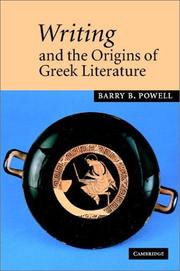
ISBN: 0521782066 9780521782067 Year: 2002 Publisher: Cambridge Cambridge University press
Abstract | Keywords | Export | Availability | Bookmark
 Loading...
Loading...Choose an application
- Reference Manager
- EndNote
- RefWorks (Direct export to RefWorks)
Greek literature --- Written communication --- Greek language --- Literacy --- Littérature grecque --- Communication écrite --- Grec (Langue) --- Alphabétisation --- History and criticism. --- History. --- Written Greek. --- Writing. --- Histoire et critique --- Histoire --- Grec parlé --- Ecriture --- History --- History and criticism --- Writing --- Written Greek --- -Greek language --- -Greek literature --- -Literacy --- -Written communication --- -Written discourse --- Written language --- Communication --- Discourse analysis --- Language and languages --- Visual communication --- Illiteracy --- Education --- General education --- Balkan literature --- Byzantine literature --- Classical literature --- Classical philology --- Greek philology --- Classical languages --- Indo-European languages --- -Writing --- Littérature grecque --- Communication écrite --- Alphabétisation --- Grec parlé --- Written discourse --- Greece --- Written communication - Greece - History --- Greek literature - History and criticism --- Literacy - Greece - History --- Greek language - Writing --- Greek language - Written Greek
Book
ISBN: 9781405162562 1405162562 9781118255322 Year: 2012 Publisher: Chichester Wiley-Blackwell
Abstract | Keywords | Export | Availability | Bookmark
 Loading...
Loading...Choose an application
- Reference Manager
- EndNote
- RefWorks (Direct export to RefWorks)
Writing --- Alphabet --- History --- Social aspects --- History. --- Social aspects. --- Writing - History --- Alphabet - History --- Writing - Social aspects
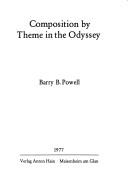
ISBN: 3445014205 9783445014207 Year: 1977 Volume: Heft 81 Publisher: Meisenheim am Glan Hain
Abstract | Keywords | Export | Availability | Bookmark
 Loading...
Loading...Choose an application
- Reference Manager
- EndNote
- RefWorks (Direct export to RefWorks)
Characters and characteristics in literature --- Personnages dans la littérature --- Homer. --- Homer --- Characters --- Epic poetry, Greek --- Odysseus (Greek mythology) in literature --- Rhetoric, Ancient --- History and criticism --- -Rhetoric, Ancient --- Classical languages --- Greek language --- Greek rhetoric --- Latin language --- Latin rhetoric --- Greek epic poetry --- Epic poetry, Classical --- Greek poetry --- Rhetoric --- Odysseus (Greek mythology) in literature. --- Rhetoric, Ancient. --- History and criticism. --- Hóiméar --- Hūmīrūs --- Homeros --- Homerus --- Gomer --- Omir --- Omer --- Omero --- Ho-ma --- Homa --- Homérosz --- האמער --- הומירוס --- הומר --- הומרוס --- هومر --- هوميروس --- 荷马 --- Ὅμηρος --- Гамэр --- Hamėr --- Омир --- Homero --- 호메로스 --- Homerosŭ --- Homērs --- Homeras --- Хомер --- ホメーロス --- ホメロス --- Гомер --- Homeri --- Hema --- Pseudo-Homer --- Pseudo Omero --- Homère --- Personnages dans la littérature --- Ancient rhetoric --- Homerus. --- Characters. --- Epic poetry, Greek - History and criticism --- Homer. - Odyssey
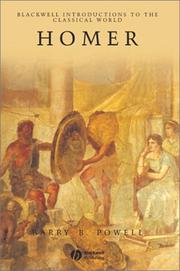
ISBN: 0631233857 0631233865 9780631233855 9780631233862 Year: 2004 Publisher: Malden Blackwell
Abstract | Keywords | Export | Availability | Bookmark
 Loading...
Loading...Choose an application
- Reference Manager
- EndNote
- RefWorks (Direct export to RefWorks)
Epic poetry, Greek --- Odysseus (Greek mythology) in literature --- Achilles (Greek mythology) in literature --- Trojan War --- Civilization, Homeric --- History and criticism --- Literature and the war --- Homer --- Criticism and interpretation --- Achilles (Greek mythology) in literature. --- Civilization, Homeric. --- Odysseus (Greek mythology) in literature. --- History and criticism. --- Literature and the war. --- Homeric civilization --- Homeros --- Homère --- Criticism and interpretation. --- Homerus --- Hóiméar --- Hūmīrūs --- Gomer --- Omir --- Omer --- Omero --- Ho-ma --- Homa --- Homérosz --- האמער --- הומירוס --- הומר --- הומרוס --- هومر --- هوميروس --- 荷马 --- Ὅμηρος --- Гамэр --- Hamėr --- Омир --- Homero --- 호메로스 --- Homerosŭ --- Homērs --- Homeras --- Хомер --- ホメーロス --- ホメロス --- Гомер --- Homeri --- Hema --- Pseudo-Homer --- Pseudo Omero --- Epic poetry, Greek - History and criticism --- Trojan War - Literature and the war --- Homer - Criticism and interpretation
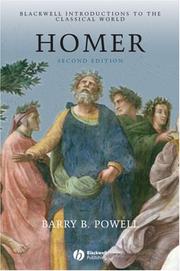
ISBN: 1405153245 9781405153249 1405153253 9781405153256 Year: 2007 Publisher: Malden Blackwell
Abstract | Keywords | Export | Availability | Bookmark
 Loading...
Loading...Choose an application
- Reference Manager
- EndNote
- RefWorks (Direct export to RefWorks)
Epic poetry, Greek --- Odysseus (Greek mythology) in literature. --- Achilles (Greek mythology) in literature. --- Trojan War --- Civilization, Homeric. --- History and criticism. --- Literature and the war. --- Homer --- Criticism and interpretation. --- Homère --- Achilles (Greek mythology) in literature --- Civilization, Homeric --- Odysseus (Greek mythology) in literature --- Homeric civilization --- History and criticism --- Literature and the war --- Homeros --- Homerus --- Hóiméar --- Hūmīrūs --- Gomer --- Omir --- Omer --- Omero --- Ho-ma --- Homa --- Homérosz --- האמער --- הומירוס --- הומר --- הומרוס --- هومر --- هوميروس --- 荷马 --- Ὅμηρος --- Гамэр --- Hamėr --- Омир --- Homero --- 호메로스 --- Homerosŭ --- Homērs --- Homeras --- Хомер --- ホメーロス --- ホメロス --- Гомер --- Homeri --- Hema --- Pseudo-Homer --- Pseudo Omero
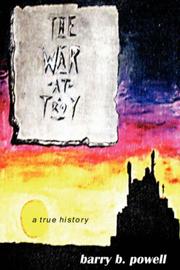
ISBN: 1425722784 9781425722784 1425722792 9781425722791 Year: 2006 Publisher: Philadelphia Xlibris
Abstract | Keywords | Export | Availability | Bookmark
 Loading...
Loading...Choose an application
- Reference Manager
- EndNote
- RefWorks (Direct export to RefWorks)
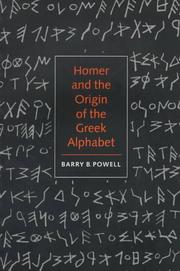
ISBN: 0521371570 052158907X 051155270X 9780521371575 Year: 1991 Publisher: Cambridge Cambridge University press
Abstract | Keywords | Export | Availability | Bookmark
 Loading...
Loading...Choose an application
- Reference Manager
- EndNote
- RefWorks (Direct export to RefWorks)
Who invented the Greek alphabet and why? The purpose of this challenging book is to inquire systematically into the historical causes that underlay the radical shift from earlier and less efficient writing systems to the use of alphabetic writing. The author reaches the conclusion that a single man, perhaps from the island of Euboea, invented the Greek alphabet specifically in order to record the Iliad and the Odyssey of Homer.
-Alphabet --- Greek language --- Alphabet --- Homer --- Homeros --- Homère --- Language. --- Homerus --- Alphabet. --- Inscriptions, Greek --- Grec (Langue) --- Inscriptions grecques --- Language --- Langue --- Homer - Language. --- Greek language - Alphabet. --- Hóiméar --- Hūmīrūs --- Gomer --- Omir --- Omer --- Omero --- Ho-ma --- Homa --- Homérosz --- האמער --- הומירוס --- הומר --- הומרוס --- هومر --- هوميروس --- 荷马 --- Ὅμηρος --- Гамэр --- Hamėr --- Омир --- Homero --- 호메로스 --- Homerosŭ --- Homērs --- Homeras --- Хомер --- ホメーロス --- ホメロス --- Гомер --- Homeri --- Hema --- Pseudo-Homer --- Pseudo Omero --- Arts and Humanities --- History --- Homère (08..?-08..? av. J.-C.) --- Grec (langue) --- Communication écrite --- Grèce --- Antiquité
Book
ISBN: 9780199326105 9780199326112 0199326118 019932610X 9780199925865 9780199925872 0199925860 9780199925865 0199925879 9780199925872 1299821626 9781299821620 0199326126 0199348502 0191988855 9780191988851 Year: 2014 Publisher: New York
Abstract | Keywords | Export | Availability | Bookmark
 Loading...
Loading...Choose an application
- Reference Manager
- EndNote
- RefWorks (Direct export to RefWorks)
Homer's Iliad is one of the foundational texts of Western Civilization. The timelessness of its story, of men battling fate amidst the horrors of war, still stirs the imaginations of readers year after year. What is offered here is the first translation by someone who is both an eminent scholar and published poet. Based on his thorough familiarity with Homeric language, Powell's free verse translation preserves the clarity and simplicity of the original, while recreating the original feel and sound of the oral-formulaic style. By avoiding the stylistic formality of earlier translations, and th
Epic poetry, Greek --- Trojan War --- Achilles --- Achìe --- Achilas --- Achille --- Achilleus --- Achilli --- Ahil --- Ahile --- Ahilej --- Ahillejs --- Aĥilo --- Aichill --- Akhilles --- Akhilleus --- Akhilleusz --- Akiles --- Akili --- Akille --- Akilles --- Akkilles --- Aquiles --- Aquilles --- Axill --- Axilles --- Ἀχιλλεύς --- آخيل --- アキレウス --- Akireusu --- 아킬레우스 --- 阿喀琉斯 --- Ахіл --- Ахил --- Ахилл --- Akhill --- Ахіллес --- אכילס --- Akhiles --- Achilles (Greek mythology) --- Epic poetry, Greek. --- Greek epic poetry --- Epic poetry, Classical --- Greek poetry --- Achilles (Mythological character)
Book
ISBN: 0520966228 9780520966222 9780520292857 9780520292864 0520292863 0520292855 Year: 2017 Publisher: Oakland, California University of California Press
Abstract | Keywords | Export | Availability | Bookmark
 Loading...
Loading...Choose an application
- Reference Manager
- EndNote
- RefWorks (Direct export to RefWorks)
"The Theogony is one of the most important mythical texts to survive from antiquity, and we devote the first section to it. It tells of the creation of the present world order under the rule of almighty Zeus. The Works and Days, in the second section, describes a bitter dispute between Hesiod and his brother over the disposition of their father's property, a theme that allows Hesiod to range widely over issues of right and wrong. The Shield of Herakles, whose centerpiece is a long description of a work of art, is not by Hesiod, at least most of it, but it was always attributed to him in antiquity. It is Hesiodic in style and has always formed part of the Hesiodic corpus. It makes up the third section of this book"--Provided by publisher.
accessible. --- accompanying notes. --- ancient greece. --- anthropologists. --- coffee table book. --- complex passage explanation. --- greek myths. --- greek poet. --- greek society. --- hesiod. --- homer. --- influential greek figures. --- linguists. --- modern translation. --- POETRY / Ancient & Classical. --- Hesiod --- Gesiod --- Geziod --- Esiodo --- Hēsiodos --- Hezjod --- Hésiode --- Hesíodo --- Hesiyodos --- הסיודוס --- Ἡσίοδος --- Criticism and interpretation. --- Hesiodus
Book
ISBN: 9780520391697 0520391691 Year: 2021 Publisher: Oakland, California: University of California press,
Abstract | Keywords | Export | Availability | Bookmark
 Loading...
Loading...Choose an application
- Reference Manager
- EndNote
- RefWorks (Direct export to RefWorks)
| Listing 1 - 10 of 21 | << page >> |
Sort by
|

 Search
Search Feedback
Feedback About UniCat
About UniCat  Help
Help News
News